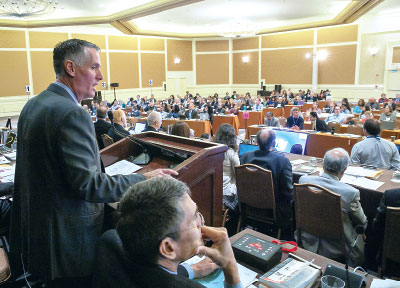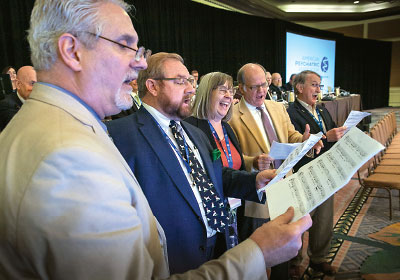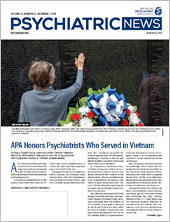Migrant children must not be separated from parents and family who are coming to the U.S. border seeking asylum. So declared APA’s Assembly last month in a position statement urging APA to advocate for keeping children and families united when going through the asylum process. Other issues addressed by the Assembly included climate change and mental health, racial discrimination against trainees and practicing psychiatrists, and
police brutality toward black men.
Position statements and other items approved by the Assembly become official APA policy if approved by the Board of Trustees. The Board’s next meeting is December 15 and 16 in Washington, D.C.
A position statement on “safe prescribing” approved by the Assembly last month is now official policy because it was approved by the Board in October. That position states that “treatment with medication of patients with mental illness requires a foundation of medical education, training, supervision, and care of patients with a broad range and severity of medical problems.”
The statement further asserts that “the safety of patients and the public must be the primary consideration of each state’s licensing agencies and legislature.”
There was widespread support for the proposed position statement opposing the separation of children at the border, as well as an action paper calling on APA to support children forcibly separated at the border. The action paper asks APA to do the following:
•
Develop resources that promote best practices on prevention and early intervention for immigrant children and adolescents.
•
Create a culturally and developmentally competent educational toolkit with the appropriate information and support. The tools should address the underlying ethical and medical-legal barriers in treating this population.
•
Endorse the use of qualified professionals in conducting the assessments of these children and adolescents.
•
Make the relevant screening instruments and other resources publicly available on the APA website.
•
Provide these resources to Immigration and Customs Enforcement (ICE) detention centers and people doing asylum evaluations so that gaps in providing culturally competent care for these children and adolescents can be effectively addressed.
The Assembly also approved, after considerable debate, an action paper calling for APA and the APA Foundation to “work in a timely, incremental, and fiscally responsible manner to end all financial investments or relationships with companies that generate the majority of their income from the exploration for, production of, transportation of, or sale of fossil fuels.”
Opponents argued that divestiture could harm APA financially without a significant impact on climate change. Proponents argued that APA’s administration had indicated that divestiture is possible without negative effects on APA’s finances and that the burning of fossil fuels is the principal driver of climate change and a threat to environmental and human health. Proponents also emphasized the enormous effects of climate change on mental health. The action paper states, “The health and mental health impacts of climate change fall disproportionately upon the mentally ill, and particularly upon children and other underrepresented populations who require greater protective efforts to avoid catastrophic mental health impacts.”
The measure was approved by a 61 percent to 39 percent vote.
Among other items the Assembly also approved the following:
•
An action paper that asks the Council on Children, Adolescents, and Their Families to develop model legislation for psychiatric quality assurance programs of psychiatric treatment in the child welfare and juvenile justice systems.
•
An action paper calling on the Board of Trustees to convene a work group including members of the Board, the Assembly, the Council on Quality Care, and the Council on Research to develop an APA position statement encouraging nonbiased and diverse membership of expert panels that develop treatment guidelines, especially regarding interpersonal psychotherapy and psychodynamic psychotherapy.
•
An action paper asking APA to convene a suicide prevention work group, whose goal would be to develop a suicide prevention strategic plan that includes a focus on high-risk groups and underserved populations. ■
APA members can access the Assembly action tracking system
here.


